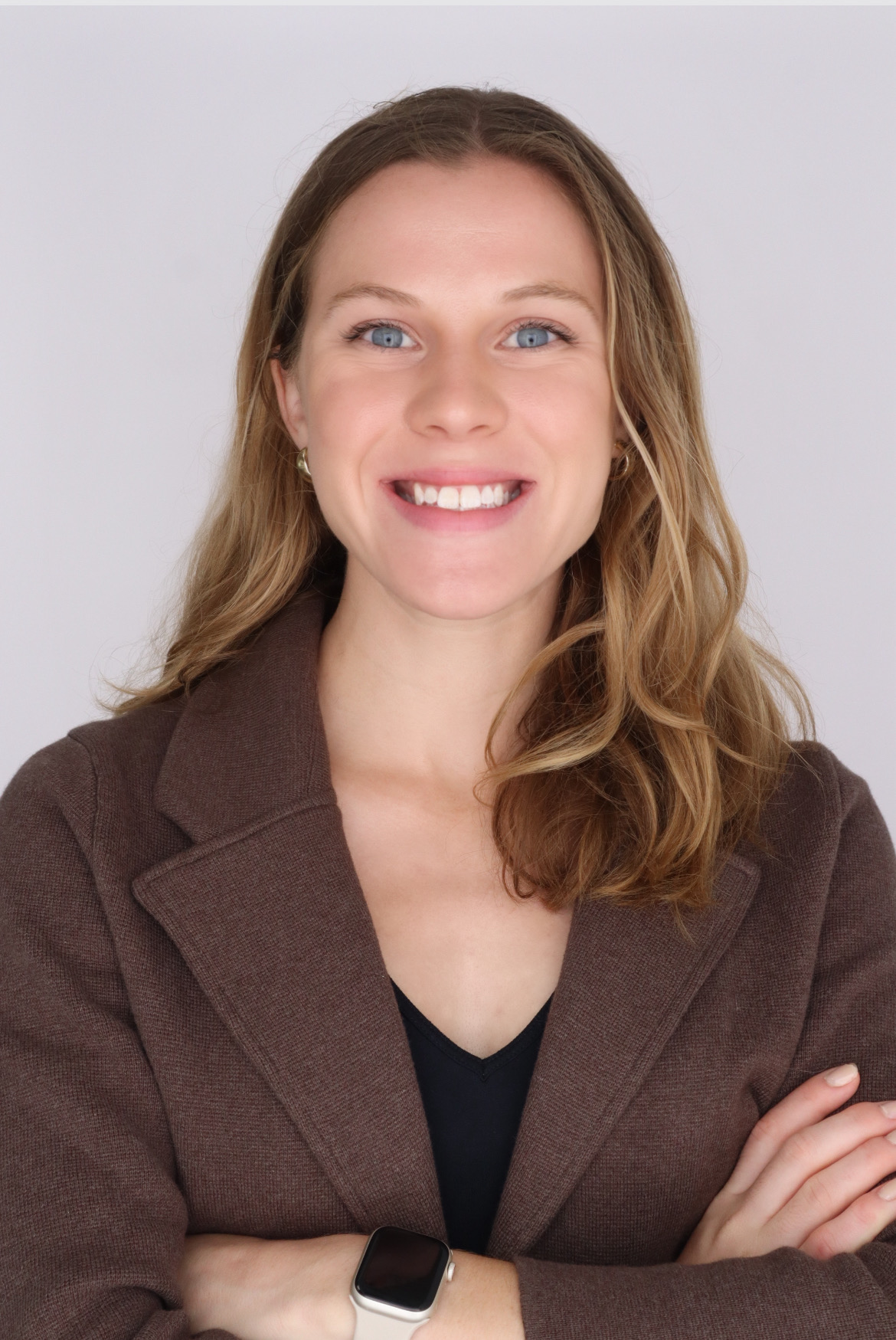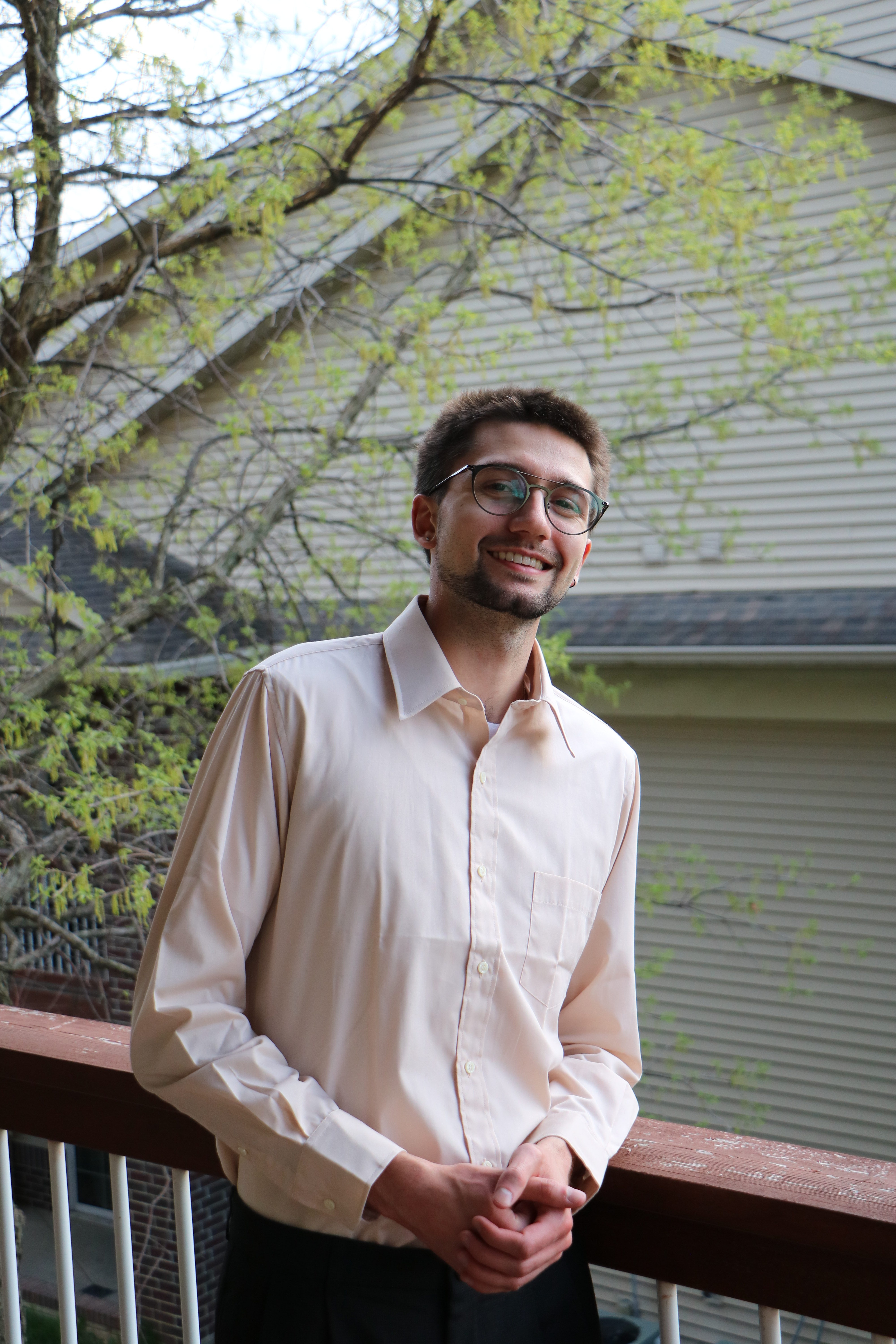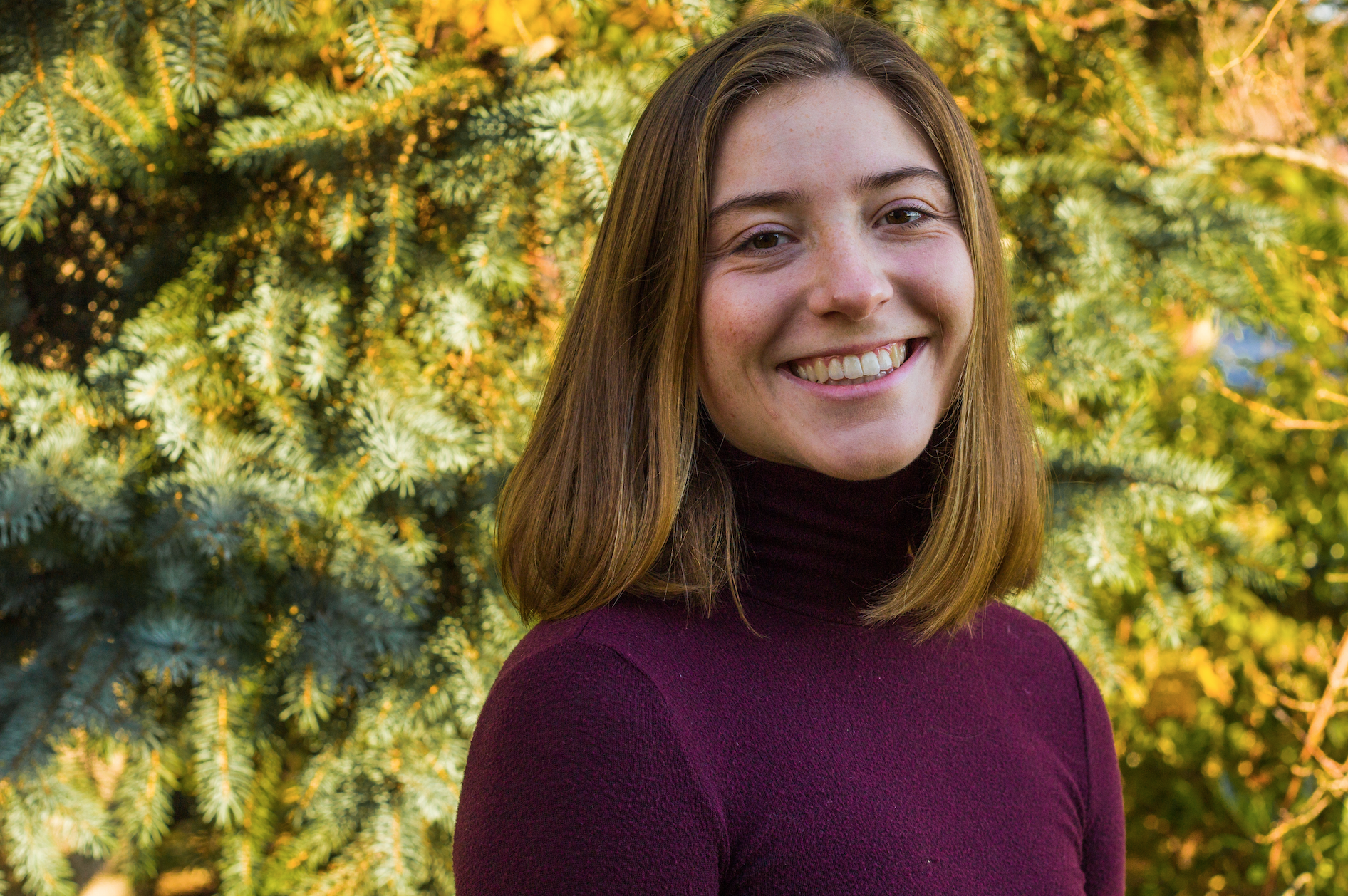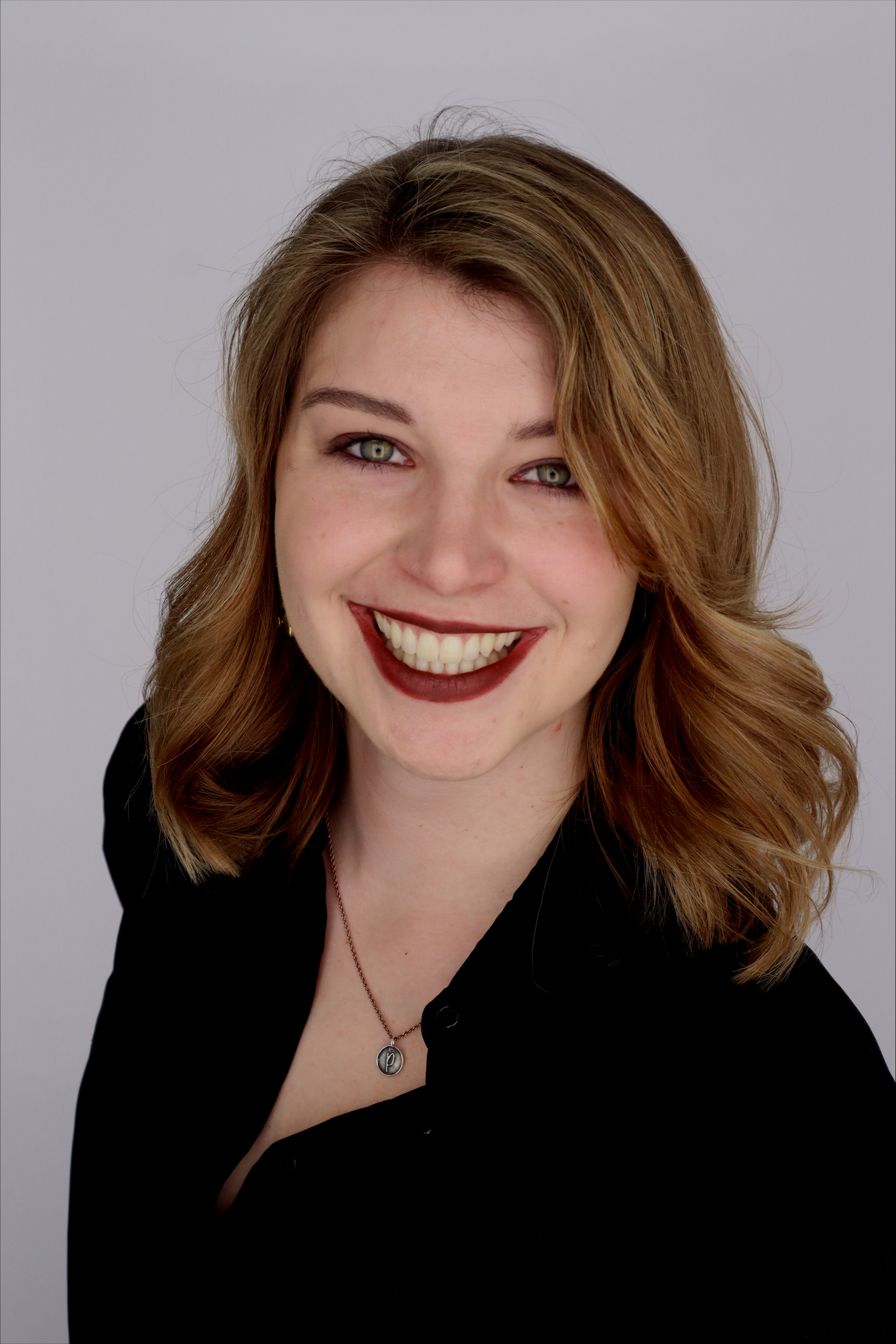By Charlotte Brookins
Graduate and undergraduate students in the College of Liberal Arts and Sciences are doing important and interesting work across disciplines. Learn more about the research, creative projects, and interests of current students Jackie Dziewior Borrowman, Cade Eshelman, Sophia McLaughlan, and Peyton Pangburn.
Jackie Dziewior Borrowman
Graduate research assistant pursuing a PhD in health and human physiology
What is the focus of your work? 
My work promotes maternal health through improving clinical practices and policies that shape the peripartum period (pregnancy and postpartum). Given the transformative time this is for pregnant persons and their families, I also aim to develop effective strategies to promote lifelong health. More specifically, pregnancy acts as a natural stress test and may uncover an individual’s future risk for chronic diseases (i.e., cardiovascular disease). The goal of my current work is to target this critical time-period to promote female cardiovascular health across the lifespan.
Tell us about the broad impact you’d like it to have.
I am passionate about women’s health and reproductive justice. I strive to have a career dedicated to equitably addressing the issues facing maternal health in the U.S. My goal is to center the populations I work with in my research and amplify the voices of individuals historically underrepresented in science and systemically marginalized.
What excites you about the research environment in the College of Liberal Arts and Sciences?
CLAS (and specifically the Department of Health and Human Physiology) has been incredible in shaping the beginning of my scientific career by providing opportunities to grow both professionally and personally. I’ve enjoyed an interdisciplinary education that supports collaboration across various fields of research. This has instilled in me the value of having various approaches to one problem and that the best science happens when we work together.
Working with incredible peers, mentors, and research participants during my time here has also taught me that at the end of the day, people are what matters most. In the words of one of my favorite poets, Maya Angelou, “People will forget what you said, people will forget what you did, but people will never forget how you made them feel.”
What are your hobbies and pursuits outside of your work?
I’ve been extremely lucky to have the support to pursue passions outside of my work. One example of this includes endurance sports. I’ve been able to continue post-collegiately pursing goals related to running including completing my first 50-mile race this fall.
Any favorite things to do in Iowa City?
Grabbing coffee at Press with my two pups or going for a hike either at Hickory Hill Park or Lake McBride with my partner are some of the things I really enjoy doing in Iowa City. Summer in Iowa City is incredible; I highly recommend participating in the Block Party or Iowa Arts Festival if the opportunity arises!
Cade Eshelman
Fourth-year undergraduate student pursuing a BA in philosophy and ethics and public policy
What is the focus of your work? 
My research began as I was considering adapted human behaviors that might help explain our ethical and moral systems. Empathy seemed like a promising candidate for its ubiquity and oft-emphasized importance, so I dug a little deeper and soon found a world of inconsistency in the existing literature about empathy. I thus decided I ought to try bringing some additional philosophical clarity to the discussion.
My work has focused on motivating a philosophical account of empathy that carefully identifies its phenomenon. In other words, I have attempted to describe what it really means for one to empathize. I have tried to motivate an account which will be useful across multiple disciplines by making use of philosophical and psychological literature on empathy.
For instance, my account is based on Amy Coplan’s (2011) philosophical account of empathy which I then contextualize drawing on Lisa Feldman Barrett’s (2014) psychological constructionist theory of emotion, the “conceptual act theory.” I also consider whether empathy is something that can be had for fictional characters based on the theory I present. I hope to continue this work in the future and consider other topics such as whether we can have empathy for groups of people, and whether one can have empathy for someone with Anti-Social Personality Disorder. I would also like to return to my original research question eventually to consider what moral or ethical salience empathy holds, if any.
Tell us about the broad impact you’d like it to have.
I have been dissatisfied with the lack of clarity in not only literature on empathy, but much of the literature on other human processes/behaviors in philosophical and psychological disciplines. I hope that my work on empathy sets a good example as to how philosophical reasoning can be useful in a psychological/social psychological context. Understanding the world through the philosophical mindset can be very useful, especially when it comes to disciplines like psychology and social psychology which rely heavily on the theoretical.
What excites you about the research environment in the College of Liberal Arts and Sciences?
I am excited by the overwhelming support I have received from faculty in the philosophy department, as well as by the many opportunities in the College of Liberal Arts and Sciences to meld the thoughts and ideas of different disciplines to create new things. Opportunities abound for any student with passion!
What are your hobbies and pursuits outside of your work?
Outside of work I spend a lot of time practicing the electric guitar, reading sci-fi, writing poetry, and playing board games with my friends and brother.
Any favorite things to do in Iowa City?
I spend a lot of my time in Iowa City at the Devlin Family Cafe in the Lindquist Center and at Chipotle downtown. Iowa City is also a great place to go for a walk in the evening.
Sophia McLaughlin
Second-year graduate student pursuing an MFA in dance on the choreography track
What is the focus of your work? 
In my creative work, I intersect the disciplines of botany and dance to create choreography. Drawing on plant observations, physiology, and field research methods, I translate these aspects into choreographic structures. I observe plants’ shapes, qualities, and patterns and, in turn, replicate these forms in the body. For example, when observing a tree, I may put the shape of a leaf in my arms, move my feet with the quality of the bark, and put this motion into the pattern of the branches. This has developed into an improvisational score that I use in the field and the studio to generate movement sequences.
In my most recent work, “Laying Fallow,” dancers traveled through a restored prairie in Hickory Hill Park, performing improvisational scores and set movement phrases. The phrase work was organized to replicate the structure of a taxonomic key located in Newcomb’s Wildflower Guide. The dancers moved through the key as though identifying plants by completing phrases that correlated to each part of the key. They identified, through movement, plants that were located in the area they were dancing in, incorporating observations from the field into the phrases.
Tell us about the broad impact you’d like it to have.
I hope this research allows audiences to see plants as animate, moving, living beings in direct relationship to human life. I am interested in how we can deepen our relationship with and understanding of plants through an embodied form. I am trying to create a space where empathy towards plants is ignited and awe for their existence is felt. As we find ways as a society to move through the climate crisis, I hope this work is a source of hope and connection to another life form that holds much knowledge for moving forward.
What excites you about the environment in the College of Liberal Arts and Sciences?
I am constantly inspired by the work of my peers and colleagues. I love that this is a space where interdisciplinary research is supported and that there is an understanding that all of our subjects are deeply interconnected and influence one another. I am also excited by the incorporation of community engagement within courses. This past year, I had the opportunity to take a class that partnered with the city of Bondurant. It was so wonderful to be in a room where multiple disciplines were represented, and we could apply our collective knowledge to a single project.
What are your hobbies and pursuits outside of work?
Outside of my work, I love to knit, read, and play board games. I am also an enthusiast for any activity outdoors; some of my favorites include backpacking, paddling, biking, and gardening.
Any favorite things to do in Iowa City?
I love walking in Hickory Hill Park! There are so many trails, and my favorite place to stop is a bench that overlooks two prairies. I also love biking by the Iowa River, stopping in at any of the bookstores, or drinking a smoothie of the day at Get Fresh!
Peyton Pangburn
Fourth-year undergraduate student pursuing a BA in international relations
What is the focus of your work? 
Last semester, I researched de facto states, which are regions attempting to break away from countries that are functionally independent but unrecognized as legal sovereigns. For this research, I focused on how recognition by the international community impacts the level of democracy and democratization in these entities. I found that as recognition increases, even if it remains partial, entities are likely to become more democratic.
I'm now looking at autonomous regions within countries, some of which are or become de facto states. Territorial autonomy is an increasingly important conflict resolution device for separatist movements, but many times autonomy is ineffective at resolving the dispute. I am looking at how mediators can impact the content of autonomy agreements, affecting whether they include several components considered critical for long-term success.
Tell us about the broad impact you’d like it to have.
The conclusions from my research on de facto states highlight the contradictions in the international system between political values versus political practice. Although ideas of self-determination and democracy are rhetorically championed, they aren’t necessarily supported in practice. If they were, countries would recognize de facto states and help them to democratize. However, I realize how problematic that policy would be for the stability of the system. Regarding mediation in intrastate conflicts, the same issues arise, leading to imperfect and out-of-touch “solutions” to persistent problems of ethnic and political self-determination. I hope that my research will eventually help lead to better policies and practices by the international community as they approach these issues in the future.
What excites you about the research environment in the College of Liberal Arts and Sciences?
CLAS is such a dynamic research environment! Many of my professors are distinguished researchers in their field and are working on various projects where student involvement is accessible and encouraged. Even though I didn’t join ongoing research, I was still readily supported in my own research pursuits and had access to many great resources and mentors. Their enthusiasm about my research was infectious, which helped me expand my ambition and seize great opportunities.
What are your hobbies and pursuits outside of your work?
Aside from being a full-time student, I am a tutor for Student Athlete Academic Services. This led to a passion for teaching, particularly English as a second language, and I volunteer as an ESL tutor through a few other organizations. I spent most of my free time last year applying for a Fulbright Award and am very excited to travel to Moldova as an English Teaching Assistant in the fall! I am fascinated by linguistics and enjoy learning new languages––currently Russian. When I can find the time, I also love to hike and rock-climb, horseback ride, and read.
Any favorite things to do in Iowa City?
I love going to the theatre, so I take advantage of the student deals at Hancher Auditorium, the Englert Theatre, and the Paramount Theatre in Cedar Rapids. I’m looking forward to seeing Chicago in May, and I hope to watch Julius Caesar at the Riverside Theater this summer!